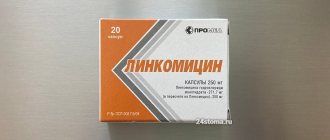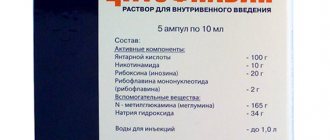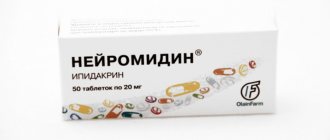Description of the drug
The main active ingredient is meldonium. Produced in Latvia, Poland, Lithuania and Slovakia.
Presented in pharmacy chains in two forms:
- A transparent solution for injection, 1 ml of which contains 100 mg of the main substance.
- Gelatin capsules with 250 or 500 mg of meldonium dihydrate. Contents: white powder with a slight odor and sweetish taste.
The solution is sold in ampoules of 5 ml, a cardboard box contains 10 ampoules and instructions for use.
Meldonium is a synthetic drug with an effect similar to the precursor substance hydroxytrimethylaminobutyric acid, related to B vitamins.
The substance is able to improve metabolic processes and provide cells with energy.
Meldonium:
- Increases performance.
- Reduces the manifestations of mental, physical and mental stress.
- Increases the strength of heart contractions.
- Reduces the frequency of angina attacks.
- Increases the body's endurance during physical activity.
The medicine should be stored in a dry place at temperatures up to 25°C for no more than 4 years.
Mildronate caps 250 mg in blister pack No. 10x4
Name
Mildronate.
Description
The active substance of the drug Mildronate® is meldonium dihydrate (meldonium). Meldonium is a structural analogue of a substance found in every cell of the body - gamma butyrobetaine. The action of this drug is based on a positive effect on the body’s energy metabolism, as well as a slight activation of the central nervous system. During exercise, Mildronate® restores the balance between oxygen delivery and consumption in cells and activates metabolic processes in them, which require less oxygen consumption to produce energy. Usually, under conditions of increased stress, the body quickly becomes exhausted, but as a result of using the drug Mildronate®, the body gets used to withstanding the load, using oxygen economically and quickly restoring energy reserves in preparation for new loads. Mildronate®, performing the functions of gamma butyrobetaine, can accelerate the transmission of nerve impulses in the body, and therefore all responses are accelerated and the overall metabolism in the body is improved. Therefore, when using the drug Mildronate®, a tonic effect is felt - memory improves, thinking speeds up, dexterity of movements increases, and the body’s resistance to harmful conditions increases.
Main active ingredient
Meldonium
Release form
White hard gelatin capsules. 10 capsules in a blister made of polyvinyl chloride film with polyvinylidene chloride coating and aluminum foil. 2 blisters along with instructions for medical use in a cardboard pack.
Dosage
250 mg
Indications for use
The drug Mildronate® is used as part of complex therapy in the following cases: - with physical and psycho-emotional overload, accompanied by a decrease in performance; - during the recovery period after cerebrovascular diseases, traumatic brain injury and encephalitis (as recommended by a doctor).
Directions for use and doses
Always use the drug in full accordance with the recommendations of your doctor or pharmacist. If in doubt, consult your doctor or pharmacist. Due to the possible stimulating effect, it is advisable to use it in the first half of the day. Recommended dose Adults The daily dose for adults is 500 mg (2 capsules). The entire dose can be taken in the morning in one dose, or divided into 2 doses (1 capsule each). The duration of the course of therapy is determined by the doctor. Special groups of patients Elderly patients For elderly patients with impaired liver and/or kidney function, the dose of Mildronate® may be reduced. Patients with Renal Impairment Since the drug is eliminated from the body through the kidneys, patients with mild to moderate renal impairment should use a lower dose of meldonium. Patients with hepatic impairment Patients with mild to moderate hepatic impairment should use a lower dose of meldonium. Use in children and adolescents There is no data on the safety and effectiveness of Mildronate® in children and adolescents (under 18 years of age), so this drug should not be used in children and adolescents (see Do not use this drug). If you have taken more Mildronate® than you should. There are no data on cases of overdose of Mildronate®. The drug is low-toxic and does not cause severe side effects. In case of low blood pressure, headaches, dizziness, accelerated heart activity (tachycardia), and general weakness are possible. In case of overdose, consult a doctor immediately. If you forgot to take the drug Mildronate® If you forgot to take the next dose of the drug Mildronate® on time, do it immediately. However, if your next dose is approaching, skip the forgotten dose and continue to use the drug as recommended at the usual dosing intervals. Do not use a double dose to replace a forgotten dose. If you stop using the drug Mildronate® When you stop using this drug, no adverse reactions are observed. If you have questions about the use of the drug, contact your doctor or pharmacist.
Use during pregnancy and lactation
If you are pregnant or breastfeeding, think you may be pregnant, or are planning a pregnancy, consult your doctor or pharmacist before using this medicine. Animal studies are insufficient to assess the effect of Mildronate® on pregnancy, embryo/fetal development, childbirth and postpartum development. The potential risk for humans is unknown, therefore Mildronate® should not be used during pregnancy (see Do not use the drug). It is unknown whether the drug is excreted into human breast milk. A risk to newborns/infants cannot be excluded and this drug should not be used while breastfeeding (see Do not use this drug).
Precautionary measures
Before using Mildronate®, consult your doctor or pharmacist. Tell your doctor if you have had liver and/or kidney failure, as liver and/or kidney function tests may need to be monitored. Children and adolescents This drug should not be used in children and adolescents under 18 years of age, as there is no data on the safety and effectiveness of meldonium in these age groups. There is no data on the effect on the ability to drive vehicles and operate machinery.
Interaction with other drugs
Tell your doctor or pharmacist if you are using, have recently used, or may start using any other medications. — Mildronate® can be used together with drugs against angina, cardiac glycosides and diuretics (promote the formation and excretion of urine from the body). — Mildronate® can be combined with anticoagulants (delay blood clotting), antiplatelet agents (prevent the formation of blood clots in blood vessels), drugs that eliminate heart rhythm disturbances and other drugs that improve microcirculation (blood circulation in small blood vessels). — Mildronate® can enhance the effect of drugs containing glyceryl trinitrate, nifedipine, beta-blockers, and other drugs that lower blood pressure and dilate blood vessels. — With the simultaneous use of meldonium with lisinopril, a positive effect of combination therapy is observed. -Additional effects are observed when meldonium is used in combination with orotic acid to reverse damage caused by ischemia/reflow. — As a result of the simultaneous use of Sorbifer and meldonium in patients with anemia caused by iron deficiency, the composition of fatty acids in red blood cells improves. — For patients with acquired immunodeficiency syndrome (AIDS), in addition to azidothymidine or other drugs for its treatment, the doctor may prescribe meldonium, since the combined use of these drugs has a positive effect on the treatment of AIDS. — An overdose of meldonium can increase the toxic effect of cyclophosphamide on the heart. — Carnitine deficiency resulting from the use of D-carnitine (an inactive isomer of carnitine)-meldonium may increase the toxic effects of ifosfamide on the heart. — Meldonium exhibits protective effects against indinavir cardiac toxicity and efavirenz-induced neurotoxicity. Do not use this drug with other drugs that contain meldonium because the risk of side effects may increase.
Contraindications
- if you are allergic to meldonium dihydrate or any other components of the drug; - with increased intracranial pressure (in case of impaired venous outflow, intracranial tumors); - if you have severe liver and/or kidney failure (there is insufficient data on the safety of use); - during pregnancy and lactation; - children and adolescents under 18 years of age (safety of use has not been verified).
Compound
— active substance – meldonium dihydrate. One capsule contains 250 mg of meldonium dihydrate, - excipients: dried potato starch, hydrated silicon dioxide (Siloid 244 FP), calcium stearate. Capsule (body and cap): titanium dioxide (E 171), gelatin.
Side effect
Like all medicines, Mildronate® can cause side effects, although not everyone gets them. If you experience any unwanted reactions, consult your doctor or pharmacist. This recommendation applies to any possible adverse reactions, including those not listed in the instructions. The following are undesirable reactions observed in previously conducted clinical studies (marked *), and undesirable reactions that were reported during the period after registration of the drug. Common (may occur in no more than 1 person in 10): • allergic reactions*; • headache*; • digestive disorders*. Rare (may affect up to 1 in 1000 people): • hypersensitivity, allergic dermatitis, urticaria, angioedema (difficulty breathing or swallowing, or swelling of the throat, face, arms and legs, lips and/or tongue), anaphylactic reaction (sudden general allergic reaction, the symptoms of which are itching, hives, swelling, difficulty breathing, shortness of breath, rapid heartbeat, rapid drop in blood pressure, dizziness, loss of consciousness, shock); • excitement, fear, obsessive thoughts, sleep disturbances; • feeling of “pins and needles”, trembling, decreased sensitivity, tinnitus, dizziness, gait disturbances, lightheadedness, loss of consciousness; • changes in heart rhythm, increased heart rate, atrial fibrillation, chest discomfort/chest pain; • increase/decrease in blood pressure, hypertensive crisis (rapid increase in blood pressure), increased blood flow to tissues (hyperemia), pallor; • sore throat, cough, difficulty breathing, short-term cessation of breathing; • disturbances in the sense of taste (metallic taste in the mouth), loss of appetite, retching, nausea, vomiting, gas accumulation, diarrhea, abdominal pain; • general/macular (limited, without elevation)/papular (small, dense with elevation) rashes, itching; • back pain, muscle weakness, muscle spasms; • frequent urination; • general weakness, chills, weakness, swelling, swelling of the face, swelling of the legs, feeling hot, feeling cold, cold sweat; • changes in the electrocardiogram (ECG), acceleration of heart function, eosinophilia (increase in the number of specific white blood cells)*. Upper abdominal pain and migraine have also been reported in connection with the use of Mildronate®. Reporting Adverse Reactions It is important to report suspected reactions after marketing authorization of a medicinal product to ensure continuous monitoring of the benefit-risk profile of the medicinal product. Healthcare professionals are encouraged to report any suspected adverse drug reactions through the national adverse reaction reporting systems of the member states of the Eurasian Economic Union. In the Republic of Belarus, it is recommended to report adverse reactions to the information database on adverse reactions (actions) to drugs, including reports of ineffectiveness of drugs (UE "Center for Expertise and Testing in Healthcare" of the Ministry of Health of the Republic of Belarus, website rceth.by).
Storage conditions
Store at a temperature not exceeding 25 °C. Store in original packaging to protect from moisture. Keep out of the reach of children. Do not use the drug after the expiration date indicated on the package after “Best before”. The expiration date is the last day of the month. Do not throw medications down the drain. Ask your pharmacist how to dispose of medications that you no longer need. These measures will protect the environment.
Buy Mildronate caps 250 mg in blister pack No. 10x4 in the pharmacy
Price for Mildronate caps 250 mg in blister pack No. 10x4
Instructions for use for Mildronate caps 250 mg in blister pack No. 10x4
Why take Mildronate?
The drug is used only in the treatment of adults. Regardless of the dosage form, the indications for prescribing Mildronate are:
- Heart diseases caused by impaired coronary circulation (in complex therapy).
- Chronic heart failure and cardialgia.
- Reduced performance.
- Pathologies of peripheral arteries.
- The recovery period after surgery to restore the body.
- Encephalopathy.
- Stroke.
- Bronchial asthma and chronic obstructive pulmonary disease.
- II and III stages of alcoholism.
- Violations of the integrity of the vessels supplying blood to the tissues of the eye.
The use of Mildronate slows down the formation of necrotic areas and shortens the rehabilitation period after acute damage to cardiac muscle tissue.
During active training, meldonium restores the balance of oxygen in cells, prevents the accumulation of toxins, and helps restore energy reserves.
The drug is successfully used in sports in healthy people because:
- Increases adaptability to physical activity.
- Improves muscle nutrition, including the heart, and accelerates their recovery.
- Reduces fatigue.
- Increases the effect of sports.
Mildronate is not suitable for gaining muscle mass, but is used to prevent overwork.
Buy Mildronate injection solution 10% 5ml No. 10 in pharmacies
Instructions for use Mildronate solution d/in. 10% 5ml No. 10
Dosage forms injection solution 10% Synonyms Idrinol Cardionate Melfor Mildroxin Group Metabolism stimulants of various chemical groups International nonproprietary name Meldonium Composition Active substance: Meldonium. Manufacturers Grindeks Joint Stock Company (Latvia), Grindeks Public Joint Stock Company (Latvia) Pharmacological action Cardioprotective, antianginal, antihypoxic, angioprotective. Improves metabolic processes, increases performance, reduces symptoms of mental and nervous tension, and has a cardioprotective effect. Regulates cellular immunity. Eliminates functional disorders of the nervous system in chronic alcoholism. Promotes the redistribution of blood flow to ischemic areas, including the brain and retina. When taken orally it is well absorbed. The maximum concentration is achieved after 1 - 2 hours. The half-life is 3 - 6 hours. Side effects: Dyspepsia, psychomotor agitation of the central nervous system, tachycardia, changes in blood pressure, skin itching, redness, rash, swelling. Indications for use Reduced performance; physical overexertion, incl. in athletes. In complex therapy - ischemic heart disease (angina pectoris, myocardial infarction), chronic heart failure, dyshormonal cardiopathy, withdrawal syndrome in chronic alcoholism, hemophthalmos and retinal hemorrhage of various etiologies, thrombosis of the central retinal vein and its branches, retinopathy of various etiologies, as part of complex therapy of acute and chronic cerebrovascular accidents. Contraindications Hypersensitivity, organic damage to the central nervous system, pregnancy, breastfeeding, childhood. Method of administration and dosage The dosage is determined by the doctor. Overdose No information available. Interaction May enhance the effects of nitroglycerin, nifedipine, beta-blockers and other antihypertensive drugs and peripheral vasodilators. Compatible with antianginal drugs, anticoagulants and antiplatelet agents, antiarrhythmic drugs, cardiac glycosides, diuretics. Special instructions Patients with chronic liver and kidney diseases should be careful during long-term use. Storage conditions List B. At room temperature.
Contraindications and side effects
It is prohibited to use Mildronate for:
- Individual intolerance to meldonium or any of the auxiliary components.
- Increased intracranial pressure, caused, among other things, by a tumor and impaired venous outflow.
Undesirable effects from taking the drug may appear in the form of:
- Allergic manifestations - itching, rashes, redness or swelling.
- Rapid heartbeat.
- Reactions from the digestive system - nausea, vomiting, heartburn, belching.
- Excessive stimulation of the nervous system.
In general, Mildronate is a low-toxic drug that does not cause life-threatening conditions. However, Mildronate is not used in pediatrics. Also, the drug is not prescribed during pregnancy and breastfeeding.
Instructions for use of Mildronate
The solution is administered undiluted intravenously according to indications; the capsules are used orally as a whole without crushing.
Mildronate injections
Prescribed for progressive angina, vascular pathologies of the fundus, cerebral circulatory disorders, myocardial infarction. In case of a heart attack, it is administered once a day in a volume of 500-1000 mg. Further treatment is carried out with capsules.
For vascular pathologies of the fundus of the eye, the solution is administered behind the eyeball or under its outer shell, 0.5 ml for 10 days.
To persons with acute circulatory disorders in the brain, Mildronate is administered intravenously once a day at a dose of 500 mg. The duration of the course of treatment is 10 days. Then the patient is transferred to capsules at a dosage of 500-1000 mg per day in one or two doses.
Mildronate capsules
Prescribed to patients suffering from diseases of the cardiovascular system as additional therapy at a dose of 500-1000 mg. It can be taken once or divided into two doses. Duration of therapy is 4-6 weeks. You can repeat courses as prescribed by your doctor 2-3 times a year.
For cardialgia, take one tablet of Mildronate 500 mg once a day.
For pathologies of peripheral arteries, the medicine is taken twice a day, 500 mg.
Athletes and people experiencing increased intellectual and physical stress can take 1000 mg in two doses for 10-14 days. After 14-21 days the course can be repeated.
For persons suffering from chronic alcoholism, Mildronate is prescribed 500 mg four times a day for 7-10 days.
The maximum dose of the drug is 2000 mg. It is recommended to take before lunch due to its stimulating effect.



